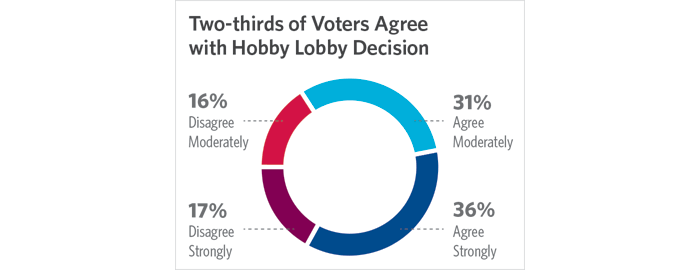Free Birth Control Much Less Compelling than Health Care Overall
Health care continues to top the charts of important issues among American voters, with a large majority calling it very influential or one of the most influential issues in motivating their political participation (70%). However, the importance of this issue does not translate to related issues such as access to free birth control. The importance of free birth control is considered much less compelling, with less than half as many saying it is at least very influential (31%). In fact, more say it is not at all influential (40%) in motivating them.
Mixed Familiarity with Hobby Lobby Case
Given the lower emphasis placed on this issue, it is not surprising that familiarity with the Supreme Court case regarding Hobby Lobby is mixed. Half of voters have heard, read, or seen something about the case, but only one in five would say they are very or extremely familiar with it (22%).
Favorable Reaction to Hobby Lobby Ruling
The majority of voters agree with the Supreme Court’s ruling that the government cannot force family businesses to violate their religious beliefs by making them provide coverage for abortion-inducing drugs and devices (67%). Furthermore, there is relatively little concern that the case could be used by employers to deny coverage to other health care services (32% very/extremely worried) or that it will be harder for women to purchase, use, and get prescriptions for birth control (59% expect no change).
Of those who are familiar with the case, 57% said the main issue of concern in the case is religious freedom, while only 35% said it was access to birth control.

Top Messages
When given a choice of two opposing messages on this topic, just over half identified with messages focused on religious liberty for businesses and organizations over those on birth control access. There is slightly higher identification with families who want to purchase plans that don’t force them to pay for birth control coverage that they disagree with (60% identify with message). Given a series of statements in favor of religious liberty over mandated access to birth control, the majority agreed with each statement, with the highest support for messages that focus on affirming the true rights of both groups.
“Every woman has the right to make her own choices about birth control. Some Americans who run family businesses and religious charities simply don’t want to be involved in those decisions. Allowing people to work according to their beliefs takes nothing away from anyone.”
81% agree
Source: Online survey using a national representative sample of 1,014 U.S. voters conducted October 7–15, 2014 with a margin of error of ±3.1%.




